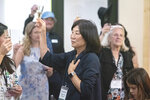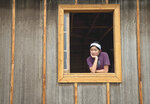Partly Cloudy, 83° F
More than 50 years ago Doug Nelson made his first trip to Wyoming as a graduate student at the University of Wyoming. That’s when he first learned about the concentration camp at Heart …
This item is available in full to subscribers.
The Powell Tribune has expanded its online content. To continue reading, you will need to either log in to your subscriber account, or purchase a subscription.
If you are a current print subscriber, you can set up a free web account by clicking here.
If you already have a web account, but need to reset it, you can do so by clicking here.
If you would like to purchase a subscription click here.
Please log in to continue |
|




More than 50 years ago Doug Nelson made his first trip to Wyoming as a graduate student at the University of Wyoming. That’s when he first learned about the concentration camp at Heart Mountain.
When he traveled to Park County to investigate, he located remnants of the camp — thanks largely to the chimney at the former hospital that served more than 14,000 prisoners during World War II. But there was nothing there to commemorate what had happened on the spot. He later wrote a Pulitzer Prize-nominated book, “Heart Mountain: The History of an American Concentration Camp,” and began his quest to honor the American citizens, entire families stripped of their homes, businesses and incarcerated people at Heart Mountain and several other camps across the U.S.
Saturday, the vice chair of the Heart Mountain Wyoming Foundation lifted a flute to toast two lifelong friends, Cody’s Al Simpson and Californian Norm Mineta, who met when they were 10-year-olds, during the grand opening of the Mineta-Simpson Institute; part of the impressive and constantly growing presence on the former site.
Mineta and Simpson met when they were 10-year-olds. Simpson’s Boy Scout troop went to the camp to meet the scouts inside the razor wire fences of the facility, of which Mineta was a member. They became best friends — an odd couple of sorts, but ended up as “brothers.”
“My dad loved Al as his brother,” said David Mineta, Norman and (stepmother) Danealia’s son, during the groundbreaking of the project. “Not like his brother, but as his brother.”
The two somehow stayed out of trouble long enough to lead successful lives as politicians on the national level. A Democrat, Mineta served both Presidents Bill Clinton and George Bush as Secretary of Transportation. Simpson, a staunch Republican, served three terms as U.S. senator from Wyoming.
Nelson stood with Simpson and his and Mineta’s family and members of the board of directors in the hot sun Saturday to ceremoniously cut the ribbon, signaling the official opening of the institute. The lifelong friendship became the rallying cry for understanding and a lesson that what happened at the concentration camps during the war should never happen again.
“I love the fact that almost from the beginning of my involvement, there was the presence of Norman Mineta and Alan Simpson as cheerleaders, guides and examples of the kind of values that we could make the agenda of the Heart Mountain Wyoming Foundation,” he said during the toast Friday night.
Without Nelson’s passion, persistence and dedication, the site may never have become a beacon of justice for the thousands imprisoned at the camp and a blow horn in the fight against racism, said the center’s Executive Director Aura Sunada Newlin.
“In so many ways, Doug Nelson is why we are standing here today,” she said.
‘Dedicated retreat space’
The Mineta-Simpson Institute will be a dedicated retreat space at the center, a home for workshops and programming specifically designed to foster empathy, courage and cooperation in the next generation of leaders. The institute will also expand the foundation’s capacity for digital outreach, allowing staff to carry the message all over the world. The institute and the center hopes to right the wrongs of the concentration camps, which weren’t taught about in schools and still come as a surprise to many visiting the gateway cities of Powell and Cody to Yellowstone National Park.
More than 40 former incarcerees were on hand for the dedication and multiple celebrations at the center. It was the first time former incarcerees and supporters were able to tour the root cellars on the property, now being renovated for public display. Tours were available of the hospital, barracks, the memorial park, which honors incarcerees who fought in WWII in American units. Taiko San Jose, where Mineta was once the mayor, gave demonstrations of the traditional Japanese drum ensembles and Johnny Yellowtail performed a song memorializing the Japanese who share in the love for Heart Mountain, which casts its shadow over the site of the camp at sunset and honored by both American Indians and Japanese Americans. The song, sung in his native Crow language, says “This is where the Japanese Americans were at by the sacred Heart Mountain.”
With few tangible memories of her time in the Heart Mountain Internment Camp as a child, Ruth Kuroda came to the pilgrimage for the first time looking for answers and trying to make a connection to the place where her family was imprisoned.
“I don’t recall too much; just that we went quietly,” she said after touring the enormous root cellar built by prisoners to store food they grew on the property to supplement the diets of thousands.
The cellar is still under construction and is planned to open in 2026.
Reason for the center
Most of the incarcerees left were children while in the camps. Their memories are faint and their families didn’t talk much about their time in the camps. Now in their 80s and 90s, they are still seeking the truth about what their families went through.
Kuroda has been researching her family’s past and the trip to Heart Mountain was intended to continue her attempts to understand what happened here. Many have refused to come, like many of Kuroda’s family members.
“They say, ‘why would I want to go back there’,” she said of those who are left in her family.
Yet, after her tour, tears welled up in her eyes as she talked about how she wished the center “was here for my parents and grandparents,” who carried the shame of their imprisonment to their graves.
Lea Nitake, a member of the board for the past five years, had 24 members of her family imprisoned at Heart Mountain. She said her American family still feels disgraced by their incarceration.
“Family members who were here didn’t talk a lot about their experience. And so it almost feels stigmatized to bring it up. It brings up difficult emotions,” she said while touring the memorial where she found the names of men in her family who fought for America in WWII.
Her position as a board member has opened opportunities to open the healing process.
“We’re still learning; it’s an ongoing process, but it is a healing process,” she said. “Our intention is to educate people all over the country, and educate future generations about what happened, how it happened, and why we need to continue learning about what happened here.”
David Mineta, Norman Mineta’s son, spoke at the Saturday banquet of the feelings of anger incarcerees and their families felt about the concentration camps. But he walked away from the weekend with pride about the center’s direction.
“We are turning this around into something that is amazing,” he said. “It’s a blazing light for justice for other folks in these times, that this will never happen again.”
Simpson, in his usual unabashed honesty, said Mineta, who died May 3, 2022, “would have loved this.”
“We loved each other, but he’s been gone for two years now,” he said. “He would have loved this. It is an overwhelming feeling.”
But he is also worried about the divisiveness of the current political scene.
“If we forget we are Americans, instead of members of a party, we’re in deep crap,” Simpson said in an interview with the Tribune. “We’ll bring that to the attention of people who use this facility.”